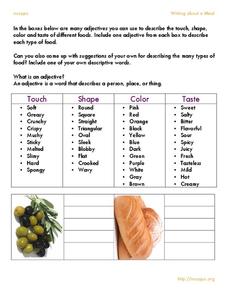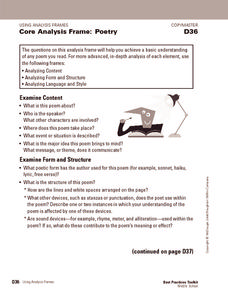Curated OER
So Much Depends Upon...Sixteen-Word Imagery Poems Inspired by Love that Dog by Sharon Creech
After reading Love That Dog by Sharon Creech (and possibly shedding a few tears), middle schoolers work on their own sixteen-word poems with a Six Trait writing activity. They focus on word choice in this activity to capture an...
Curated OER
Same Setting, Different Moods: Voice and Word Choice Using Lord of the Flies
Whether it's dark, delightful, or somber, set the mood with William Golding's Lord of the Flies. High-schoolers practice descriptive writing by creating the appropriate mood for an original scene, starring one of the book's main...
Curated OER
Analyzing Poetry
Use this poetry analysis worksheet to help your learners understand a poem of their or your choosing. This resource asks class members to summarize the poem and analyze it by looking at voice, word choice, imagery, and theme. The...
Curated OER
Beautiful Noise Poetry
"What a beautiful noise comin' up from the street; got a beautiful sound, it's got a beautiful beat..." Use Neil Diamond's "Beautiful Noise" to guide your class through a Six Trait writing activity, in which they write an original poem...
Curated OER
Setting the Tone with Figurative Language
Explore figurative language with your secondary class. Extending a language arts unit, the lesson prompts middle schoolers to examine how an author's word choice establishes a story's tone, possibly using metaphors, similes,...
Curated OER
Using Imagery
Show, don't tell! Pairs work together to change a list of telling sentences into showing sentences using picture words that create vivid pictures in the readers’ minds.
Pennsylvania Department of Education
6 Traits: Word Choice
Pupils explore language arts by participating in a vocabulary usage activity. In this word choice instructional activity, students read examples of great word usage in literature and discuss with the class why some words appear stronger...
Curated OER
Of Mice and Men by John Steinbeck: Animal Imagery
Why does Steinbeck use animal imagery to describe Lennie in Of Mice and Men? Readers examine a series of descriptions and comment on the effect Steinbeck creates with his word choice.
Curated OER
Descriptive Prompt: Precise Language
Incorporate sensory details into a piece of descriptive writing. First, elementary and middle schoolers improve a piece of writing by using precise, vivid language, as well as appropriate word choice. They then listen to a variety of...
Nosapo
Writing about a Meal
You don't need to be a food critic to describe your meal accurately! A series of activities introduce learners to vivid adjectives when writing about the taste, smell, and feel of food. After working with word choice, parts of a...
Curated OER
The Sound of…Poetry!
Scritch, scratch, scritch. It's the sound of pupils writing poetry! Focus on sensory language and onomatopoeia with a writing lesson. After listening to some sounds, learners examine a couple of poems that include sound words and then...
Houghton Mifflin Harcourt
Core Analysis Frame: Poetry
Dig deep into any piece of poetry with a set of analysis questions. Ponder the content, form, and language of poetry and provide some question for critique. The first two pages include general questions, and the remainder of the document...
Curated OER
The Adventures of Tom Sawyer: Using Vivid Language
Analyze the components of precise wording and vivid language in this language arts lesson plan. Middle school writers illustrate a passage from Mark Twain's The Adventures of Tom Sawyer, and write a response to a Norman Rockwell print....
Curated OER
Polar Bear Literacy Activity
Students generate vocabulary words synonymous or related to "noise." In this literacy lesson, students listen to the book Polar Bear, Polar Bear, What do You Hear? by Bill Martin and Eric Carle and discuss the meaning of vocabulary words...
Curated OER
A Creative Presentation
Bring writing to life with this lesson in which elementary and middle schoolers create a display of the imagery they identify in a series of Gary Paulsen books. They read the suggested materials, identify imagery and descriptive...
Curated OER
Vivid Verbs
Spice up your writing! Your amateur writers will benefit from concentrating on understanding and improving verb use in writing. An introductory activity addresses weak verbs. A second exercise helps them see the importance of strong...
Curated OER
Color Poems
Learners describe colors. In this descriptive writing lesson, students brainstorm color descriptions using all of the senses except sight. Learners write poems including similes, sensory images, and interesting word choice. Examples are...
Curated OER
Narrative Writing
Fifth graders study narrative writing. In this language arts lesson, 5th graders review how an author uses vivid verbs, imagery, and adjectives to capture reader's attention. Students explore literary devices of foreshadowing, flashback...
Curated OER
Using Onomatopoeia to Tell the Story of an Imaginary Field Trip
Students explore language arts by utilizing word choice to compose a paragraph. In this phonetics lesson, students discuss the importance of a "voice" in their writing as they read the book Rattletrap Car. Students write paragraphs about...
Curated OER
Picture Me with Words
Students search in newspapers for words that describe them or what they like. They gather the words and use them to create a self-portrait. They read "boring" sentences and rewrite them using more descriptive words. They write 10 word...
Curated OER
Diction: Formal and Informal Language
Coke or Pepsi? Is it the taste or the advertising that determines preference? As part of a study of diction, class members examine two passages, one formal and one informal, about Coca-Cola and Pepsi. In addition, they consider word...
Mr. Ambrose
The Great Gatsby, F. Scott Fitzgerald
Good discussion questions, quizzes, and tests teach as well as assess. Readers of The Great Gatsby will learn much from the materials in a 36-page packet designed to help students prepare for the AP Literature exam. Included in the...
Curated OER
Borrowing Narrative Skills from Mr. Fletcher: Using a "Prompts in Reverse" Technique to Inspire Your Writers
Help your class find their writing voices with this lesson which uses the work of Ralph Fletcher to guide a "Prompt in Reverse" activity. Using the chapter "First Pen" from Fletcher's Marshfield Dreams, learners decipher what they...
National Endowment for the Humanities
From Courage to Freedom: The Reality behind the Song
Students study how Frederick Douglass uses language to describe a realistic picture of slavery in his writings which are primary source documents. They examine his use of word choice, imagery, irony, and rhetorical appeals and use slave...

























